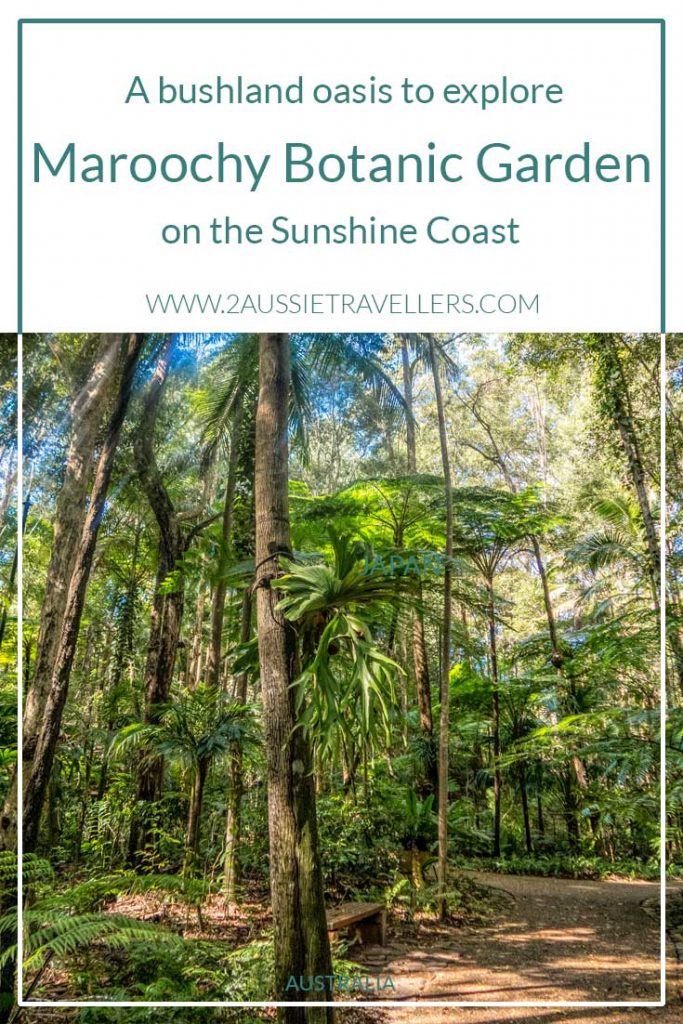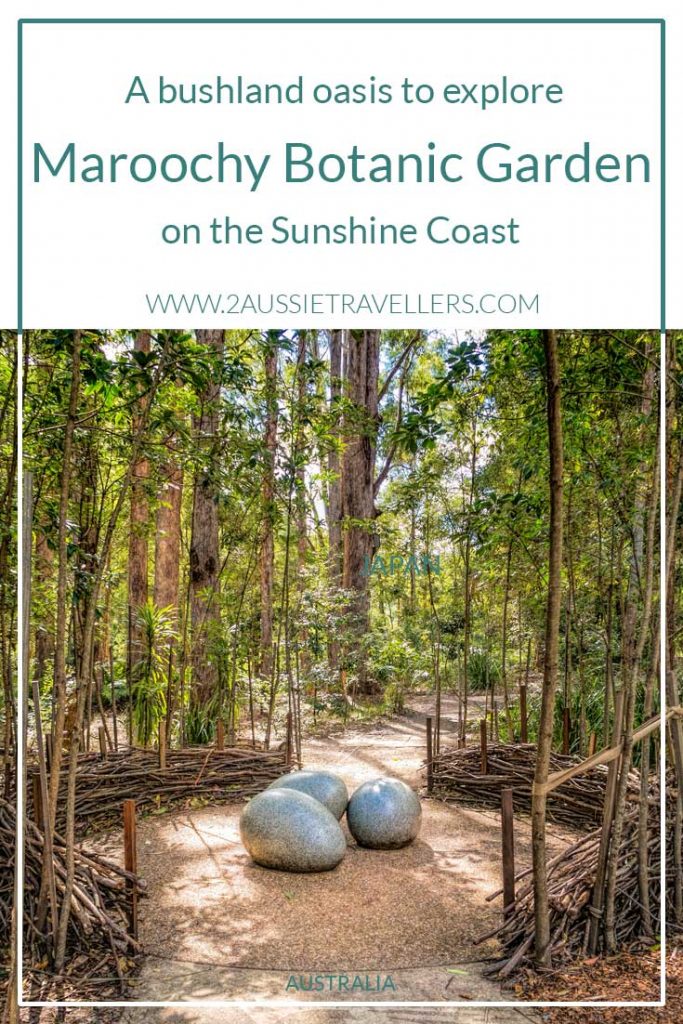The Sunshine Coast has so much to offer beyond the surf and golden sand. There’s no doubt that it’s a beach paradise from top to bottom but there are also many less discovered attractions and the Maroochy Botanic Gardens with their bushland setting is one of them. Almost no one I’ve mentioned these to in the past few weeks had been and many hadn’t heard of them, take a look and you might be surprised.

You will probably be aware of the rainforest walks in the Sunshine Coast hinterland, there are many there that we love and we highly recommend many parts of Maleny and the Obi Obi gorge but the Maroochy botanic gardens offer a rainforest experience only half the distance from the coastal strip.
If you are going to complete all the tracks and spend some time relaxing at the lagoons edge and over a picnic in the gardens you could easily spend the day here. Alternative set aside a couple of hours and pick one or two of the areas to explore.
These are bushland botanic gardens rather than the more typical city botanic gardens so you’ll find a lot of natural bushland areas and plantings of native and endemic plants that would typically grow in the area rather than flower beds and exotics. There is some signage identifying plants and some great information about our local flora but it’s not all through the garden.
An example is the coastal banksia shown below whose flowers attract many local birds. The banksia is from the Proteaceae family that spread across Gondwana 144 million years ago, when the supercontinent broke apart and Australia drifted north these ancient plants and some of our more unique animals like the wombat and kangaroo came with it.
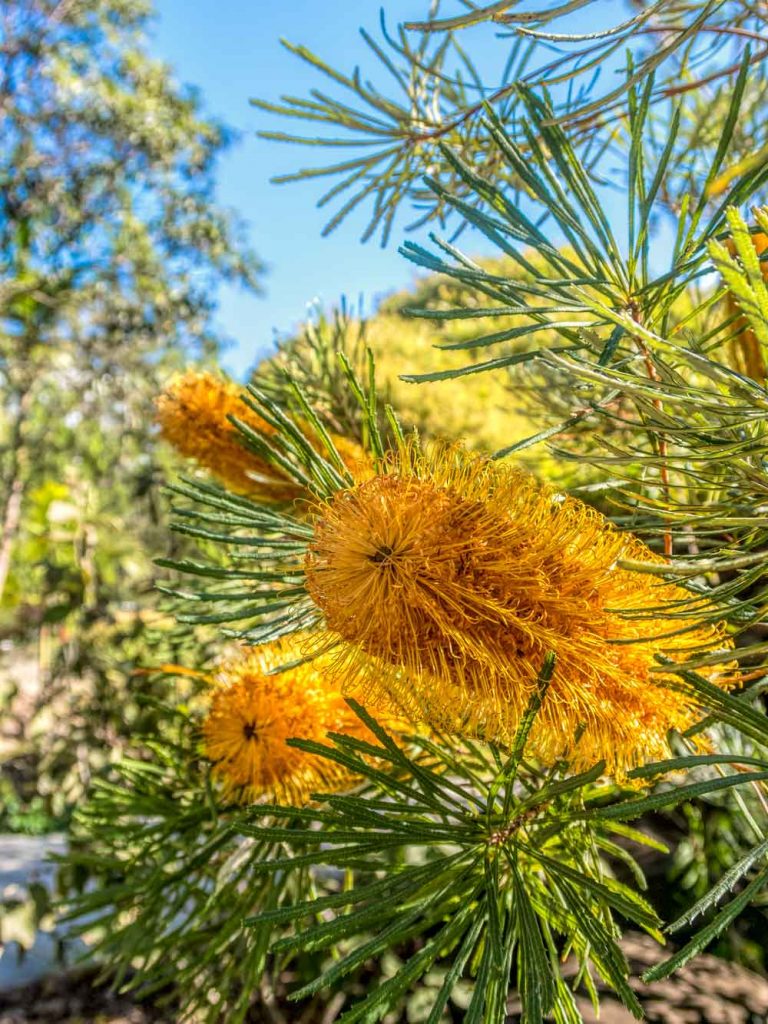
Table of Contents
Bushwalks within the gardens
The gardens are set in a 112-hectare site of lowland coastal bush. A natural environment that had become increasingly rare on the Sunshine Coast and many other parts of the country due to its historical desirability for farming which saw it mass cleared and more recently for residential sprawl. That makes this huge tract with its wildlife and birdsong even more essential to protect.
There are several walking tracks within the gardens which will suit different fitness levels and the time you have to spend here.
The Lagoon Walk
If you only have time for one of the tracks this is a good choice. It’s only a 1 km loop so will take under half an hour at a leisurely pace. It follows the central lagoon with bridge crossings of several of its feeder creeks along the way.
It’s a naturally formed dirt track which means that it can be muddy or slippery after rain. About halfway you will come to a split in the track, up the hill to right is the Upland bushwalk so turn left here. Just a little further along you’ll come to a smaller track heading off to the left, back towards the lagoon, with a small arrow sign.
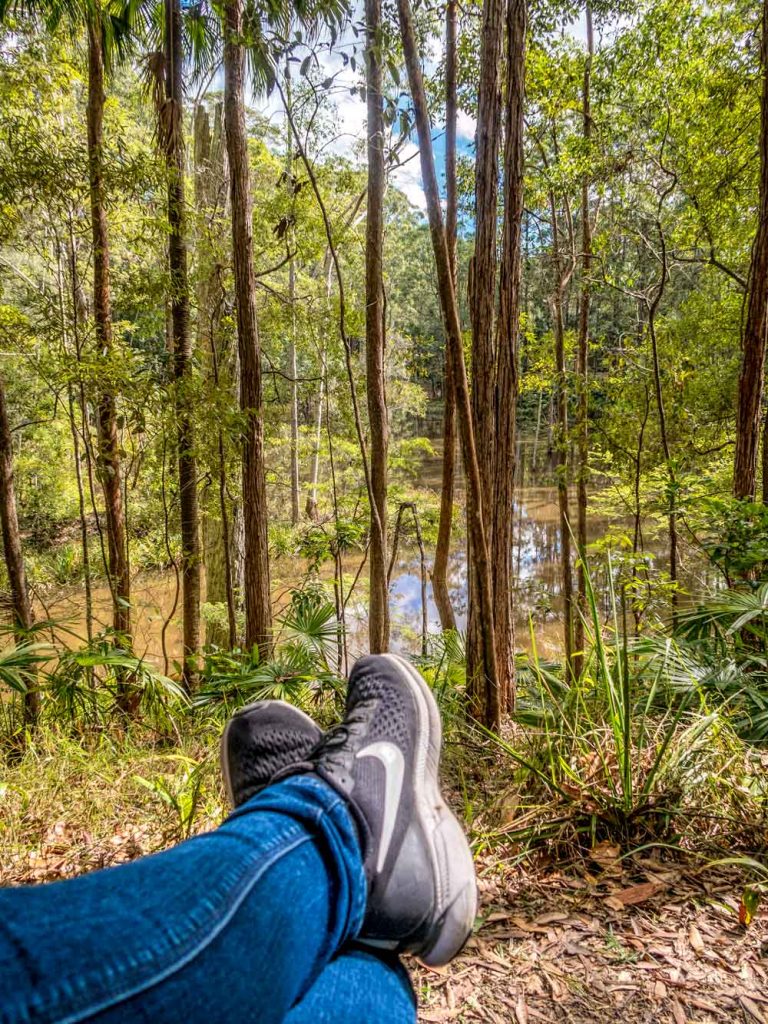
This is a short loop that is well worth following, it takes you down to a seating platform overlooking the lagoon. We’d carried our hot cups and gingernut biscuits with us and it made the perfect spot for morning tea with a flock of rainbow bee-eaters diving off the trees above us into the lagoon.
Upland Bushwalk
The Upland Bushwalk starts out following the same path as the Lagoon Walk turning right and up the hill at the sign. This one is about 2 km and will take under an hour to walk. It does include some steeper uphill sections and is again on a naturally formed dirt track so it may get muddy and slippery when it’s wet, it also involves a couple of creek crossing that under normal conditions won’t involve getting wet feet.
You complete the walk via a section of the Creek track if you turn right, or take the slightly longer option via a different section of the Creek Track and Ephemeral Wetlands if you turn left at the T junction.
Creek Track
The Creek Track links to the end of the Upland Bushwalk to return you to the Arts and Ecology Centre and carpark but it is also a loop track that can be done alone. This one is 1.4 km and will take around half an hour to walk. Like the others it’s a natural dirt track so can be slippery or muddy when it’s wet and there are creek crossings on this one too so they do warn about flash flooding after heavy rains.
Other themed garden areas
Within the main part of the garden around the lagoon there are various garden sections around the central lagoon area with their own walking tracks, lawn areas and picnic spaces.
One of the more recent developments is the Whipbird walk, a 700 m track with a gentle slope, often these names are a misnomer but you can’t miss the distinctive call of the Whipbird and you are likely to hear if not see a few through here.
The ferny glade is a cooler moist section of the garden near where the creek joins the lagoon. This would be wonderfully cool in summer but is quite an impressive sight against the blue sky in winter too.

There are other sections too, a few we didn’t make it through on this trip like the Ephemeral Wetland walk and Mossy Log walk but there is something here that will appeal to most visitors.
Sculpture Garden Walk
The Sculpture Garden was created in 2005 with the artworks being created over a 16 day period with international artists coming together from South Korea, Japan, USA, Spain, France, Slovakia with our own local artists from South Australia and Queensland.
Each work was created from Queensland sourced rock, either sandstone from Helidon near Toowoomba or marble from Chillagoe, 200 km inland from Cairns. These rocks were formed along with Australia 100’s of millions of years ago forged through heat and pressure.
There is a sealed path all through here and it is on a flat to gentle slope. The bushland garden itself is beautiful but the art pieces and notes from the artists throughout make it something unique. These are a few of our favourite pieces.
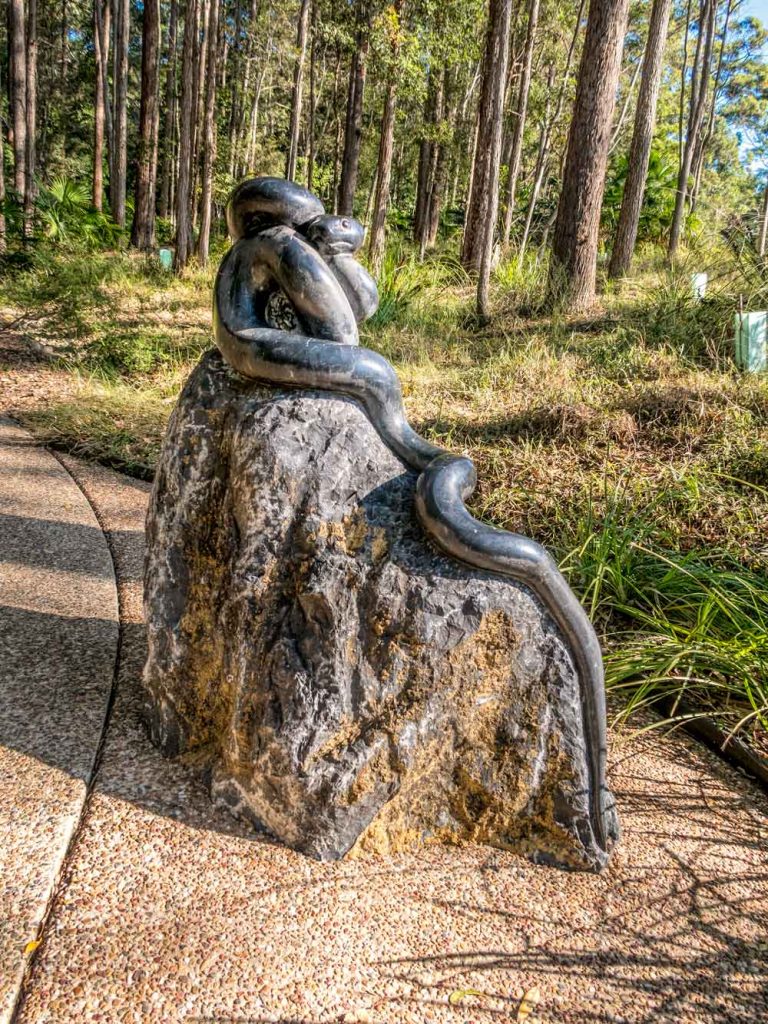


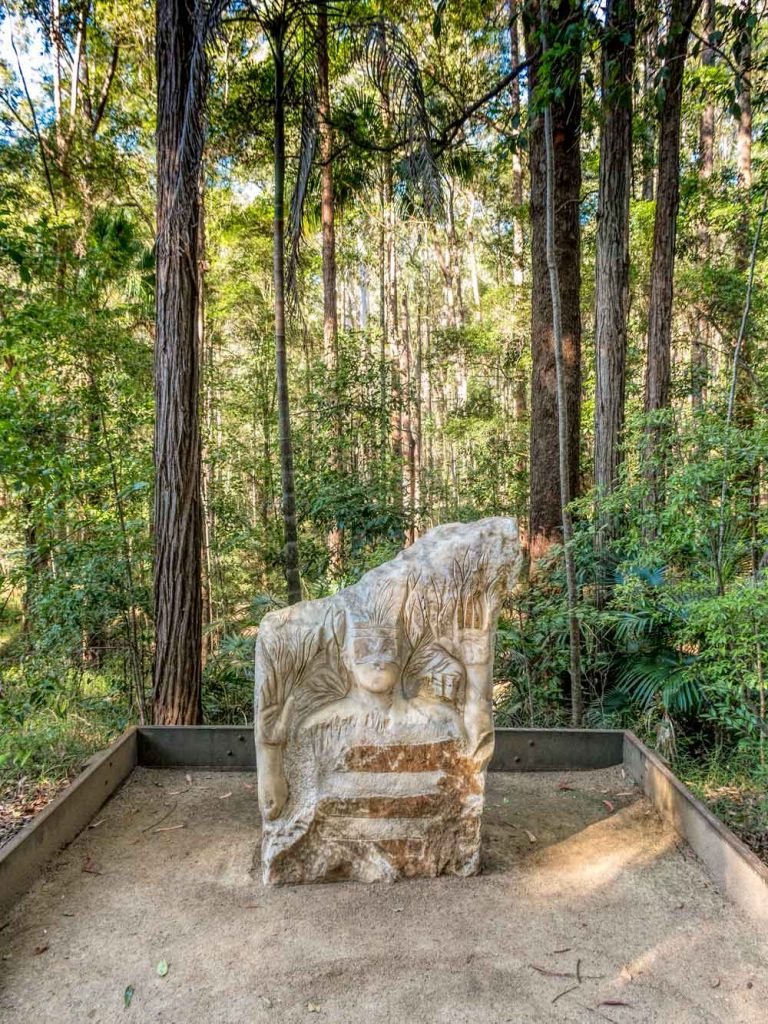
Rare and endangered section
As you head down this way you will come to a robust colonnade that gives thanks to the friends of the Maroochy Botanic Gardens for all the incredible work they have done and continue to do on the site. Gowing on the structure is one of my favourite flowering natives known as the Fraser Island Creeper or Tecomanthe Hillii.
It’s a woody climber that can grow up to 10 metres up a tree and has dramatic clusters of lolly pink tubular flowers that have no obvious fragrance. It a plant that is endemic to Fraser Island, the worlds largest sand island off the coast north of here. It also endemic to a handful of spots in coastal south-east Queensland and really quite special.

The best display of flowers will generally be in October and I hope to pop back into see that later in the year but we saw some early buds and flowering at the beginning of August.
Visitor Information
Entry fee
Entry to the gardens is free for all visitors. If you would like to make a small donation it is appreciated and there are a couple of points around the entrance where a gold coin donation can be made to help support the upkeep of the gardens and facilities.
Opening hours
The gardens are open 7 days a week. During the summer season (November until March) they are open 7 am until 6 pm, during the winter season (April until October) they are open 7 am until 5 pm.

Facilities available
There are many seats and tables, some of them under shelter available for public use. You can also make use of the expansive lawn areas. Visitors are able to bring picnics to enjoy within the gardens but to protect the bushland setting there are no BBQ facilities or rubbish bins, any rubbish needs to be taken out with you.
There are several toilet facilities in gardens that are exceptionally well kept and clean. During 2020 there are signs at the various entrances making people aware of social distancing restrictions.
There is a good amount of car parking available. The way it is set out with one-way loop access and a good number of longer parking bays makes it ideal for campervans. These parking bays are not set up to drive through and they aren’t suitable for caravans or oversized RVs.
Pets
As a bushland park domestic pets are not permitted.
Wheelchair access
The picnic areas, recreations centre, some of the garden areas and the Sculpture Garden Walk have sufficiently wide paved access and a gentle slope for wheelchair and stroller access.
If you found this article useful please consider saving it to Pinterest. It makes it easy for you to find it again, it helps us, and it helps other travellers to find the information they are looking for.
